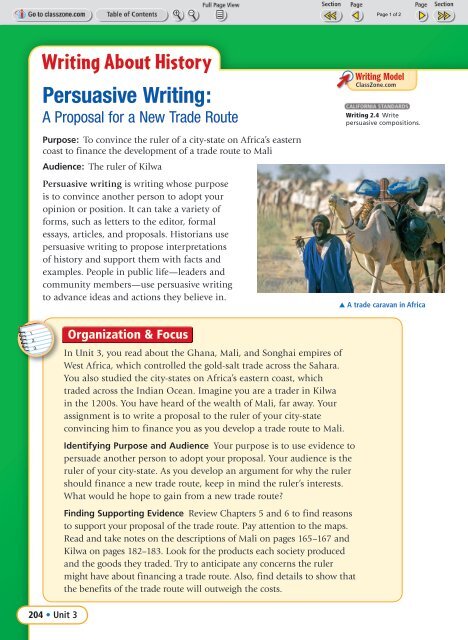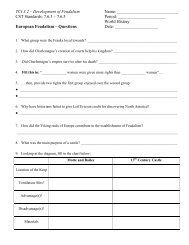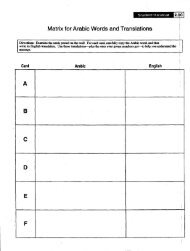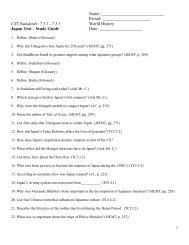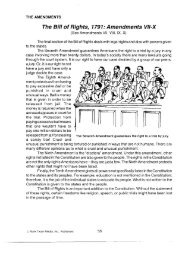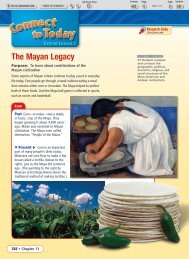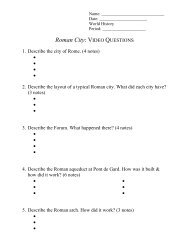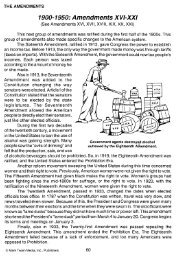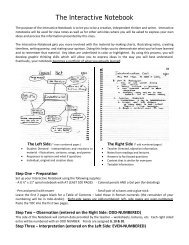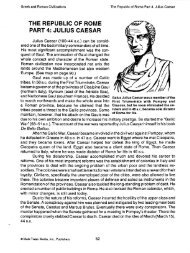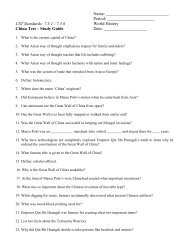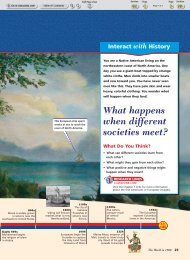Persuasive Writing
Persuasive Writing
Persuasive Writing
Create successful ePaper yourself
Turn your PDF publications into a flip-book with our unique Google optimized e-Paper software.
<strong>Writing</strong> About History<br />
<strong>Persuasive</strong> <strong>Writing</strong>:<br />
A Proposal for a New Trade Route<br />
<strong>Writing</strong> Model<br />
ClassZone.com<br />
<strong>Writing</strong> 2.4 Write<br />
persuasive compositions.<br />
Purpose: To convince the ruler of a city-state on Africa’s eastern<br />
coast to finance the development of a trade route to Mali<br />
Audience: The ruler of Kilwa<br />
<strong>Persuasive</strong> writing is writing whose purpose<br />
is to convince another person to adopt your<br />
opinion or position. It can take a variety of<br />
forms, such as letters to the editor, formal<br />
essays, articles, and proposals. Historians use<br />
persuasive writing to propose interpretations<br />
of history and support them with facts and<br />
examples. People in public life—leaders and<br />
community members—use persuasive writing<br />
to advance ideas and actions they believe in.<br />
▲ A trade caravan in Africa<br />
<br />
<br />
<br />
Organization & Focus<br />
In Unit 3, you read about the Ghana, Mali, and Songhai empires of<br />
West Africa, which controlled the gold-salt trade across the Sahara.<br />
You also studied the city-states on Africa’s eastern coast, which<br />
traded across the Indian Ocean. Imagine you are a trader in Kilwa<br />
in the 1200s. You have heard of the wealth of Mali, far away. Your<br />
assignment is to write a proposal to the ruler of your city-state<br />
convincing him to finance you as you develop a trade route to Mali.<br />
Identifying Purpose and Audience Your purpose is to use evidence to<br />
persuade another person to adopt your proposal. Your audience is the<br />
ruler of your city-state. As you develop an argument for why the ruler<br />
should finance a new trade route, keep in mind the ruler’s interests.<br />
What would he hope to gain from a new trade route?<br />
Finding Supporting Evidence Review Chapters 5 and 6 to find reasons<br />
to support your proposal of the trade route. Pay attention to the maps.<br />
Read and take notes on the descriptions of Mali on pages 165–167 and<br />
Kilwa on pages 182–183. Look for the products each society produced<br />
and the goods they traded. Try to anticipate any concerns the ruler<br />
might have about financing a trade route. Also, find details to show that<br />
the benefits of the trade route will outweigh the costs.<br />
204 • Unit 3
Research & Technology<br />
Good persuasive writing depends on strong evidence.<br />
Use facts to convince your ruler of your plan. Do<br />
additional research to find out what products West<br />
Africa has to offer your city-state. Use technology to<br />
find this information. The chart below explains how.<br />
Technology Tip Check with your<br />
librarian to find out what electronic<br />
services your local library has.<br />
• Most libraries have<br />
electronic card<br />
catalogs. You can<br />
search these by author,<br />
title, or subject to<br />
find information in a<br />
number of ways.<br />
Using Technology in Research<br />
• Some libraries have<br />
access to online<br />
databases of magazine<br />
articles, such as Infotrac,<br />
which are searchable in<br />
the same way.<br />
• Search engines can help<br />
you locate thousands of<br />
sources of information<br />
on the World Wide Web.<br />
• Electronic encyclopedias<br />
on CDs contain a wealth<br />
of information. Many<br />
encyclopedias are also<br />
online and have links to<br />
Web sites for additional<br />
information.<br />
Outlining and Drafting Make an outline showing the three main<br />
parts of your proposal. The introduction should grab the ruler’s<br />
interest and state your recommendation. The body of your proposal<br />
should offer facts and examples in support of your recommendation.<br />
Present your supporting arguments in order of importance, saving the<br />
most important argument for last. The body of your proposal should<br />
also show how to overcome any potential problems. The conclusion<br />
should tie together the ideas in the rest of the proposal and make a<br />
final strong appeal to the ruler and his interests.<br />
Evaluation & Revision<br />
When you have finished the first draft of your proposal,<br />
exchange papers with a classmate. Compare and contrast<br />
your arguments with his or hers. Rework your proposal<br />
as needed to make your arguments as strong as possible.<br />
Then edit your work to make it free of errors.<br />
Publish & Present<br />
Make a neat final copy of your proposal. Prepare a cover<br />
for it, decorated with images from the cultures of Africa.<br />
If possible, read your proposal to your classmates and display<br />
it on a bulletin board.<br />
Self-Check<br />
Does my proposal<br />
show an awareness of my<br />
audience and purpose?<br />
have an introduction stating<br />
my recommendation and<br />
making a strong appeal?<br />
contain well-organized and<br />
convincing evidence?<br />
have a strong conclusion<br />
with a final appeal?<br />
205


